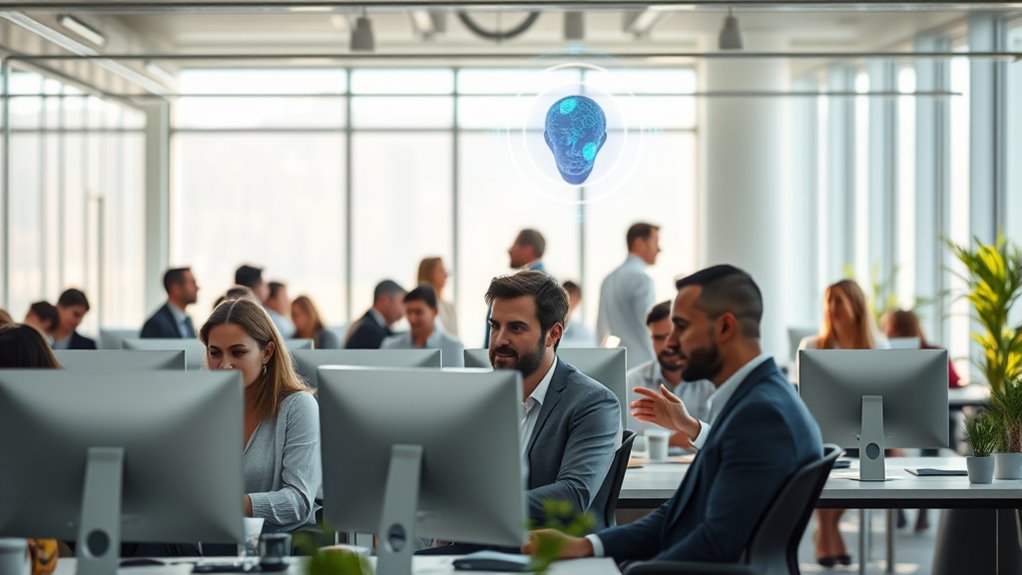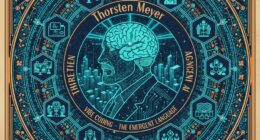AI can both reduce boring, repetitive tasks and introduce new stressors like job insecurity and constant monitoring. While automation can boost your efficiency and free up your time for more meaningful work, it may also cause anxiety and fears of displacement without proper organizational support. How AI affects your well-being depends on how employers manage these changes. Keep exploring to understand how organizations can help turn AI into a positive force for employees.
Key Takeaways
- AI reduces repetitive tasks, increasing efficiency and freeing employees for more meaningful work, thus enhancing well-being.
- Proper AI implementation and transparency build trust, minimizing stress related to automation fears and surveillance.
- Organizations supporting mental health and providing skill development help employees adapt and reduce anxiety.
- AI can proactively detect burnout and mental health issues, offering personalized resources to improve well-being.
- When managed ethically with a focus on human needs, AI generally reduces drudgery and alleviates work-related stress.

Artificial intelligence is transforming the workplace in ways that directly affect your well-being. As AI becomes more integrated into your daily tasks, it’s vital to understand how this automation impact influences your mental health and overall job satisfaction. For many, AI reduces the drudgery of repetitive work, freeing up time for more meaningful and engaging activities. Tasks that once drained your energy or caused frustration now get handled efficiently by intelligent systems, allowing you to focus on creative problem-solving, strategic thinking, or building relationships. This shift can lead to a sense of accomplishment and boost your motivation, as you’re no longer bogged down by mundane chores. Implementing effective organization techniques can further enhance your ability to adapt to these technological changes smoothly.
However, the influence of AI isn’t solely positive. The very automation that alleviates some burdens might also introduce new sources of stress. The fear of job displacement, for example, can weigh heavily on your mind, especially if you feel unsure about your future in a rapidly changing environment. Constant monitoring and algorithmic oversight can sometimes make you feel like you’re under scrutiny, leading to anxiety and a sense of loss of control. It’s essential for organizations to provide mental health support alongside AI implementation. When companies actively foster open communication, offer counseling services, and create pathways for skill development, they help mitigate the negative emotional impacts that automation can bring.
Moreover, AI can be a valuable tool for mental health support in the workplace. Advanced algorithms now identify early signs of burnout, depression, or stress by analyzing patterns in your work behavior and communication styles. When integrated thoughtfully, AI-driven mental health support systems can provide personalized resources or prompt you to seek help before issues escalate. This proactive approach can enhance your well-being and foster a healthier work environment. Still, it’s critical that such systems respect your privacy and are implemented ethically, so you feel safe and supported rather than surveilled.
Ultimately, whether AI reduces stress or adds to it largely depends on how it’s managed. Properly designed, AI can serve as a partner rather than a threat, easing your workload and offering mental health support tailored to your needs. When organizations prioritize transparency, invest in employee well-being, and recognize the human element behind the technology, AI can be a powerful tool for improving your work life. While the automation impact is undeniable, your experience with AI’s influence on mental health depends on how thoughtfully it’s integrated into your workplace environment.
Frequently Asked Questions
How Does AI Impact Employee Job Security Long-Term?
AI impacts your job security by increasing automation risk, which could make some roles redundant over time. You might worry about losing tasks to machines, but AI also creates new opportunities for you to develop valuable skills. To stay secure long-term, adapt by learning how to work alongside AI and focus on areas where human judgment remains essential. This proactive approach helps you mitigate automation risks and maintain job stability.
Can AI Help Improve Workplace Mental Health Support?
AI can substantially improve workplace mental health support. You benefit from AI-driven feedback that provides personalized insights and guidance, helping you recognize early signs of stress. Mental health apps powered by AI offer confidential access to resources and self-care tools, making support more accessible and tailored to your needs. This technology can foster a healthier environment, encouraging open conversations and proactive well-being measures, ultimately reducing stress and promoting resilience.
What Ethical Concerns Arise From AI Monitoring Employees?
You might feel like AI monitoring employees could invade your privacy, turning your workplace into a surveillance state. Ethical concerns skyrocket when it comes to privacy invasion, bias, and fairness, making you wonder if AI systems unfairly target or judge you. It’s like having a robot constantly watching your every move, which can lead to stress, mistrust, and unfair treatment. Balancing innovation with ethics is essential to avoid these pitfalls.
How Can Companies Ensure AI Benefits All Employees Equally?
You can guarantee AI benefits all employees equally by actively addressing workplace equality and AI bias. Implement transparent algorithms and regularly audit AI systems to prevent discrimination. Engage diverse teams in designing and testing AI tools, and provide training to recognize bias. By fostering an inclusive environment and holding your organization accountable, you help create fair opportunities, ensuring AI supports every employee rather than reinforcing existing disparities.
Are There Industry-Specific Differences in Ai’s Effects on Well-Being?
Yes, industry-specific differences shape AI’s impact on well-being. You’ll find that sectors like healthcare and manufacturing, with unique sector-specific challenges, experience distinct effects during industry adaptation. In healthcare, AI can alleviate administrative burdens, boosting job satisfaction. Conversely, in manufacturing, it might increase stress due to job security concerns. Recognizing these nuances helps you tailor AI integration strategies that support employee well-being across diverse sectors.
Conclusion
Ultimately, embracing AI can either ease your exhaustion or escalate your anxiety. By thoughtfully tailoring technology to tackle tedious tasks, you can foster fulfillment and freedom. However, neglecting the nuances of your needs risks ramping up stress and stifling satisfaction. So, stay sensitive to signals, steer smartly, and seize the supportive side of AI. With mindful management, you’ll master a balance that boosts wellbeing without bringing burdens.









